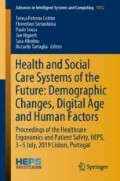Abstract
The paper focuses on recent advances in the development of a simulation-based training program for patient handling. The program [1] intends to support caregivers in the construction of a relevant and efficient gesture, integrating situational variations, preserving health and encouraging the autonomy of patients: the “reasoned handling care”. Videos of scenario-based simulations are made during the training session and discussed with the trainees. Scenarios used to be designed by the trainer. In this experiment, trainees were asked to design themselves the simulation scenarios. It was hypothesized that designing scenarios would increase the trainees’ capacities for situational awareness. The methodology that was used and the benefits and limits of the participatory design of scenarios are presented and discussed.
Access this chapter
Tax calculation will be finalised at checkout
Purchases are for personal use only
References
Malet, D., Benchekroun, T. H., Falzon, P., Vidal-Gomel, C.: Patient handling as an healthcare activity: a simulation-based training methodology. In: HEPS Conference “Healthcare and Societies, New Challenges, New Opportunities” Toulouse, 5–7 October 2016
Kay, K., Glass, N., Evans, A.: It’s not about the hoist: a narrative literature review of manual handling in healthcare. J. Res. Nurs. 19(3), 226–245 (2014)
Nelson, A.: Safe patient handling and movement: a guide for nurses and other health care providers. Springer, New-York (2006)
Hignett, S.: Intervention strategies to reduce musculoskeletal injuries associated with handling patients: a systematic review. Occup. Environ. Med. http://oem.bmj.com/cgi/content/full/60/9/e6 (2003)
Pastré, P.: Didactique professionnelle et développement. Psychologie française 42(1), 89–100 (1997)
Samurçay, R., Rogalski, J.: Exploitation didactique des situations de simulation. Le Travail Humain 61, 333–359 (1998)
Schön, D.A.: The Reflective Practitioner: How Professionals Think in Action. Basic Books, New York (1983)
Mollo, V., Nascimento, A.: Reflective practices and the development of individuals, collectives and organizations. In: Falzon P (ed.) Constructive Ergonomics, pp. 205–220. CRC Press, Boca Raton (FL) (2014)
Dismukes, R.K., Smith, G.M.: Facilitation and Debriefing in Aviation Training and Operations. Routledge, London (2017)
Clot, Y., Faïta, D.: Genres et styles en analyse du travail concepts et méthodes. Travailler 4, 7–42 (2000)
Denis, D., et al.: Proposition d’une définition de la compétence en manutention et impacts sur la formation. Le Travail Humain 76, 129–153 (2013)
Vidal-Gomel, C., Fauquet-Alekhine, P.: Reflections and theoretical contributions regarding trainers’ practice and simulation. In: Fauquet-Alekhine, P., Puet, N. (eds.) Simulation Training: Fundamentals and Applications. Improving Professional Practice Through Simulation Practice, pp. 1–29. Springer International Publishing, Cham (2016). https://doi.org/10.1007/978-3-319-19914-6_1
Mollo, V., Falzon, P.: Auto- and allo-confrontation as tools for reflective activities. Appl. Ergon. 35, 531–540 (2004)
Author information
Authors and Affiliations
Corresponding author
Editor information
Editors and Affiliations
Rights and permissions
Copyright information
© 2019 Springer Nature Switzerland AG
About this paper
Cite this paper
Malet, D., Falzon, P., Vidal-Gomel, C. (2019). Developing Patient Handling Competences Through Participatory Design of Simulation Scenarios. In: Cotrim, T., Serranheira, F., Sousa, P., Hignett, S., Albolino, S., Tartaglia, R. (eds) Health and Social Care Systems of the Future: Demographic Changes, Digital Age and Human Factors. HEPS 2019. Advances in Intelligent Systems and Computing, vol 1012. Springer, Cham. https://doi.org/10.1007/978-3-030-24067-7_41
Download citation
DOI: https://doi.org/10.1007/978-3-030-24067-7_41
Published:
Publisher Name: Springer, Cham
Print ISBN: 978-3-030-24066-0
Online ISBN: 978-3-030-24067-7
eBook Packages: Intelligent Technologies and RoboticsIntelligent Technologies and Robotics (R0)

